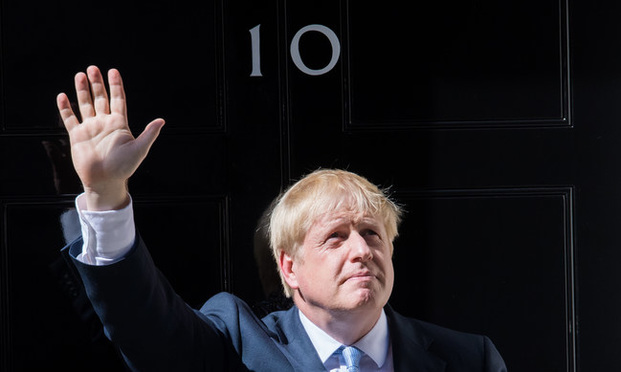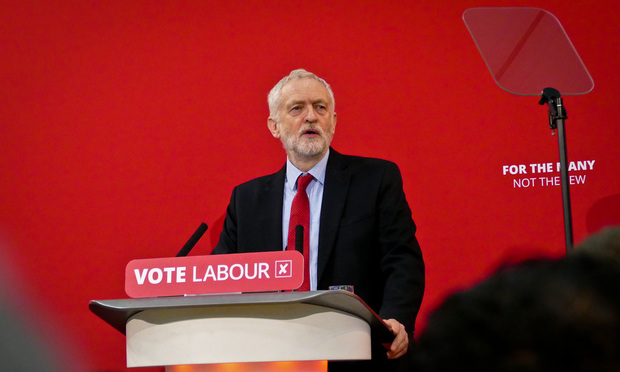'Continuing Uncertainty is the Worst of all Worlds': UK Lawyers Prepare for a December Election
From optimism about breaking the Brexit deadlock through to concerns over Corbyn, partners across London share their thoughts on the prospect of another general election.
October 31, 2019 at 05:54 AM
7 minute read
 U.K. Prime Minister Boris Johnson
U.K. Prime Minister Boris Johnson
"It feels like we have been in election mode for months, so it is good that an election will be held," says Macfarlanes senior partner-elect, Sebastian Prichard Jones, commenting on the upcoming U.K. general election, which is set to take place on December 12.
His view reflects a wider swell of opinion among U.K. lawyers regarding a third election in four years that will pit the Conservative party, led by current prime minister Boris Johnson, against the incumbent opposition leader Jeremy Corbyn, while other parties such as the Liberal Democrats and the Brexit Party vie for a larger share of the electorate vote.
"Our clients want clarity and an ability to plan for the future," Prichard Jones says. "A result which perpetuates the existing situation, with no majority either way, would be regarded by most clients as a bad outcome."
Although a majority government might end some uncertainty, it does not mean lawyers are necessarily relishing the prospect of the impending political campaigns. Lee Ranson, the co-CEO of Eversheds Sutherland, says: "The legal sector, in common with most business sectors, will be hoping for an outcome that helps bring an end to the uncertainty of the last 12 months. Unfortunately, that may well prove to be wishful thinking."
He adds: "December's election is predicted to be the most difficult to call for many years. How much 'normal' party loyalties will give way to concerns about Brexit remains to be seen and I expect there will be many twists and turns between now and December 12."
"The legal sector will be hoping for an outcome that helps bring an end to the uncertainty of the last 12 months. Unfortunately, that may well prove to be wishful thinking"
Central to each campaign will be each party's stance on Brexit, with the Tories pitching Johnson's latest withdrawal agreement, Labour backing a second referendum and the Lib Dems looking to revoke Article 50. Other policies such as climate, immigration and public services will likely loom large as the campaign continues.
"The best outcome is a majority government so that parliament can be effective, because I think the continuing uncertainty is the worst of all worlds"
DAC Beachcroft's managing partner, David Pollitt, feels the prospect of an election is "concerning" but that it is "probably the right thing to do because the continuing uncertainty is having an effect on the demand for legal services".
He adds: "The best outcome is a majority government so that parliament can be effective, because I think the continuing uncertainty is the worst of all worlds."
For some, the scale of disruption since the referendum in 2016 has already taken its toll. Oliver Brettle, partner and global executive committee member at White & Case, tells Legal Week: "The ongoing uncertainty of the last three and a half years has sapped a lot of business confidence."
He adds: "Whatever the outcome of the Brexit debate and the next election, the reputation of the U.K. as a stable place, politically, and as a good base to build an EU-focused business, has been undermined. Whether it is irretrievably damaged is hard to say."
 Some lawyers expressed concern about a Corbyn-led government.
Some lawyers expressed concern about a Corbyn-led government.Along with uncertainty, some law firm leaders expressed concern about the prospect of a Labour-led government. "From a professional point of view, I'm concerned that a Corbyn government wouldn't benefit business generally," says Pollitt.
"A Corbyn-led government would be a very real challenge. The tax plans and anti-business rhetoric would lead to a fairly rapid flight of capital"
Others have suggested that Labour's Brexit policy might add further uncertainty. Charles Brasted, partner at Hogan Lovells, comments: "While the Labour Party has alighted on an official position on Brexit, that position promises further re-negotiation and another vote. Businesses have to weigh up whether the prize of a potentially different outcome is worth that further uncertainty."
Brasted also adds: "Brexit is not the only thing on the boardroom agenda though. We have seen a spike in demand across a number of sectors for advice on Labour party plans, particularly on infrastructure nationalisation."
One partner at a large US firm who did not want to be named goes further: "A Corbyn-led government would be a very real challenge. The tax plans and anti-business rhetoric would lead to a fairly rapid flight of capital. Memories of the first months of the Mitterrand and Hollande governments in France come to mind. And remember, unlike France, we are a service industry-focused economy and relocating services is 100% easier than relocating a factory."
Other reactions
Bird & Bird competition partner, Richard Eccles, says: "The biggest issue in the general election, at least for lawyers, may well be Brexit. It will certainly not be the only issue, but it will perhaps be the one where concerns can be most clearly defined. A Conservative majority would probably result in Brexit happening on January 31, or even sooner if the withdrawal agreement can be implemented sooner. While a withdrawal agreement would mean a transitional period until the end of 2020, this would not give much extra time.
"It is a concern that under the revised Political Declaration, a free trade agreement rather than a wider relationship agreement is referred to, meaning that there may well not be any liberalisation of services going beyond the WTO commitments, as was mentioned in the previous draft Political Declaration. This would obviously include legal services, and raises possible concerns for U.K. lawyers regarding legal practice rights in relation to the EU27. The legal practice rights position matters as regards formal competence to advise on EU law, legal professional privilege and rights in the EU Court."
"If the outcome of the election brings greater certainty on our future relationship with the EU – and the trading relationships we have with other countries – then that can only be a good thing for our clients"
James Miller, RPC managing partner, says: "The key thing for our clients is certainty. Without certainty it's hard for businesses to plan properly for the future. If the outcome of the election brings greater certainty on our future relationship with the EU – and the trading relationships we have with other countries – then that can only be a good thing for our clients. But that still remains a big if…"
Charles Brasted, partner at Hogan Lovells, says: "Shaping the future relationship between the U.K., the EU and the rest of the world is as urgent as it is complex, and businesses do recognise that they too play their part in that, by engaging actively and widely with policymakers. The upcoming election needs to be about where we are going. Boris Johnson's agreement does not answer that question: the transition period may end in December 2020, meaning that another cliff edge is not far away.
"Either way, this election does not deliver imminent certainty or stability. Businesses have already been adapting to heightened uncertainty as the new norm and that will continue."
This content has been archived. It is available through our partners, LexisNexis® and Bloomberg Law.
To view this content, please continue to their sites.
Not a Lexis Subscriber?
Subscribe Now
Not a Bloomberg Law Subscriber?
Subscribe Now
NOT FOR REPRINT
© 2025 ALM Global, LLC, All Rights Reserved. Request academic re-use from www.copyright.com. All other uses, submit a request to [email protected]. For more information visit Asset & Logo Licensing.
You Might Like
View All
Is KPMG’s Arizona ABS Strategy a Turning Point in U.S. Law? What London’s Experience Reveals
5 minute read
KPMG Moves to Provide Legal Services in the US—Now All Eyes Are on Its Big Four Peers

International Arbitration: Key Developments of 2024 and Emerging Trends for 2025
4 minute read
The Quiet Revolution: Private Equity’s Calculated Push Into Law Firms
5 minute readTrending Stories
Who Got The Work
J. Brugh Lower of Gibbons has entered an appearance for industrial equipment supplier Devco Corporation in a pending trademark infringement lawsuit. The suit, accusing the defendant of selling knock-off Graco products, was filed Dec. 18 in New Jersey District Court by Rivkin Radler on behalf of Graco Inc. and Graco Minnesota. The case, assigned to U.S. District Judge Zahid N. Quraishi, is 3:24-cv-11294, Graco Inc. et al v. Devco Corporation.
Who Got The Work
Rebecca Maller-Stein and Kent A. Yalowitz of Arnold & Porter Kaye Scholer have entered their appearances for Hanaco Venture Capital and its executives, Lior Prosor and David Frankel, in a pending securities lawsuit. The action, filed on Dec. 24 in New York Southern District Court by Zell, Aron & Co. on behalf of Goldeneye Advisors, accuses the defendants of negligently and fraudulently managing the plaintiff's $1 million investment. The case, assigned to U.S. District Judge Vernon S. Broderick, is 1:24-cv-09918, Goldeneye Advisors, LLC v. Hanaco Venture Capital, Ltd. et al.
Who Got The Work
Attorneys from A&O Shearman has stepped in as defense counsel for Toronto-Dominion Bank and other defendants in a pending securities class action. The suit, filed Dec. 11 in New York Southern District Court by Bleichmar Fonti & Auld, accuses the defendants of concealing the bank's 'pervasive' deficiencies in regards to its compliance with the Bank Secrecy Act and the quality of its anti-money laundering controls. The case, assigned to U.S. District Judge Arun Subramanian, is 1:24-cv-09445, Gonzalez v. The Toronto-Dominion Bank et al.
Who Got The Work
Crown Castle International, a Pennsylvania company providing shared communications infrastructure, has turned to Luke D. Wolf of Gordon Rees Scully Mansukhani to fend off a pending breach-of-contract lawsuit. The court action, filed Nov. 25 in Michigan Eastern District Court by Hooper Hathaway PC on behalf of The Town Residences LLC, accuses Crown Castle of failing to transfer approximately $30,000 in utility payments from T-Mobile in breach of a roof-top lease and assignment agreement. The case, assigned to U.S. District Judge Susan K. Declercq, is 2:24-cv-13131, The Town Residences LLC v. T-Mobile US, Inc. et al.
Who Got The Work
Wilfred P. Coronato and Daniel M. Schwartz of McCarter & English have stepped in as defense counsel to Electrolux Home Products Inc. in a pending product liability lawsuit. The court action, filed Nov. 26 in New York Eastern District Court by Poulos Lopiccolo PC and Nagel Rice LLP on behalf of David Stern, alleges that the defendant's refrigerators’ drawers and shelving repeatedly break and fall apart within months after purchase. The case, assigned to U.S. District Judge Joan M. Azrack, is 2:24-cv-08204, Stern v. Electrolux Home Products, Inc.
Featured Firms
Law Offices of Gary Martin Hays & Associates, P.C.
(470) 294-1674
Law Offices of Mark E. Salomone
(857) 444-6468
Smith & Hassler
(713) 739-1250








